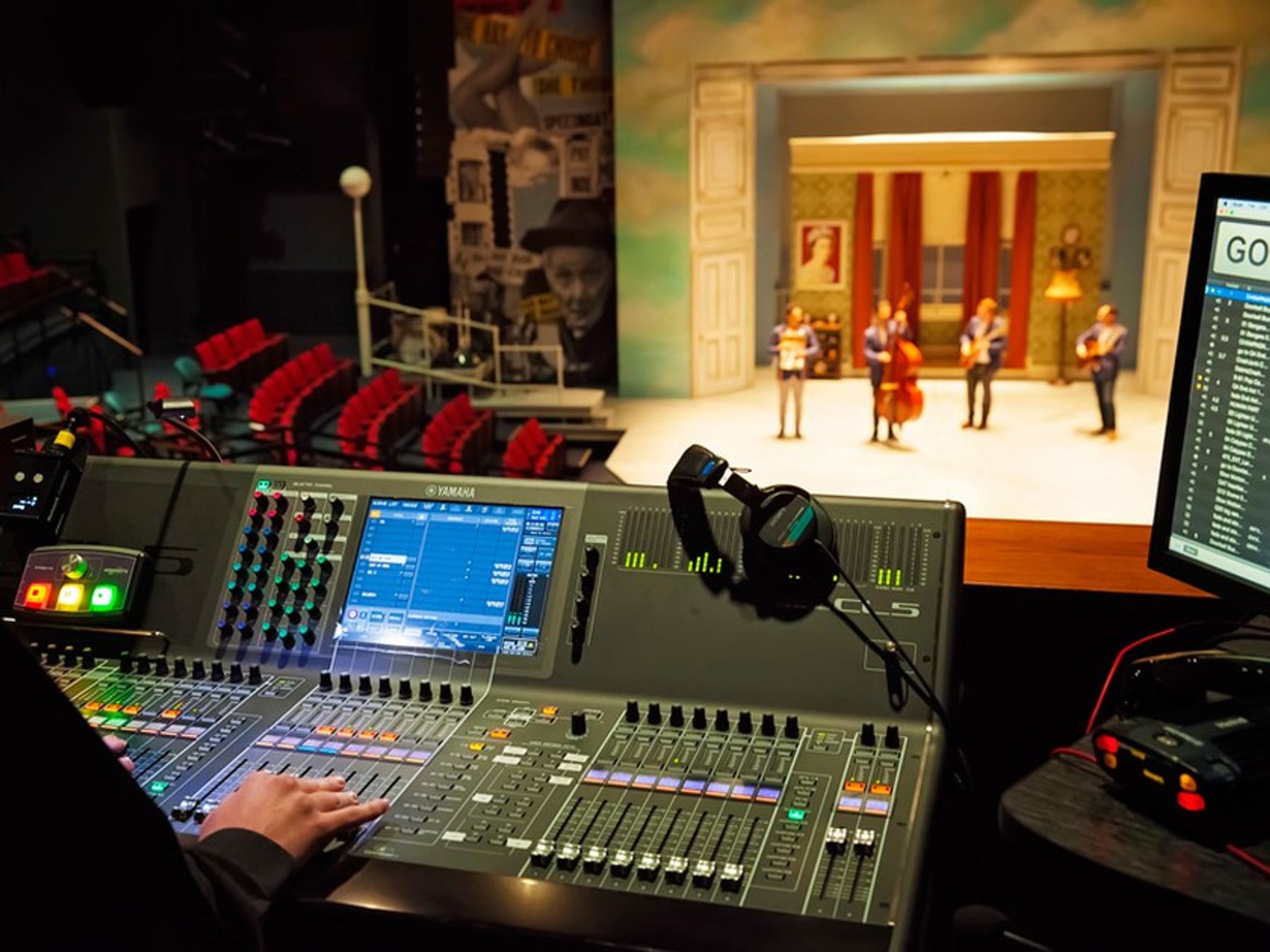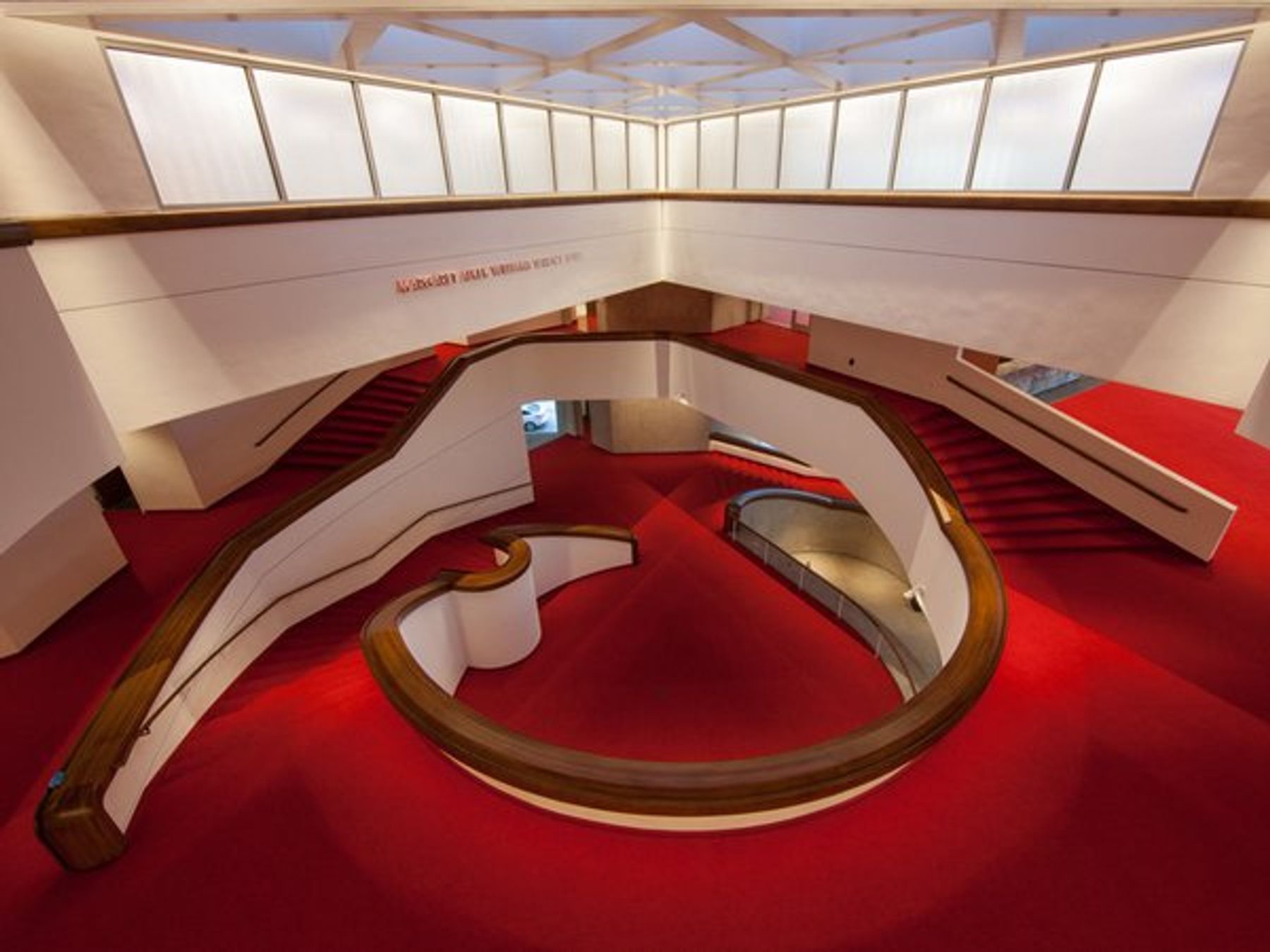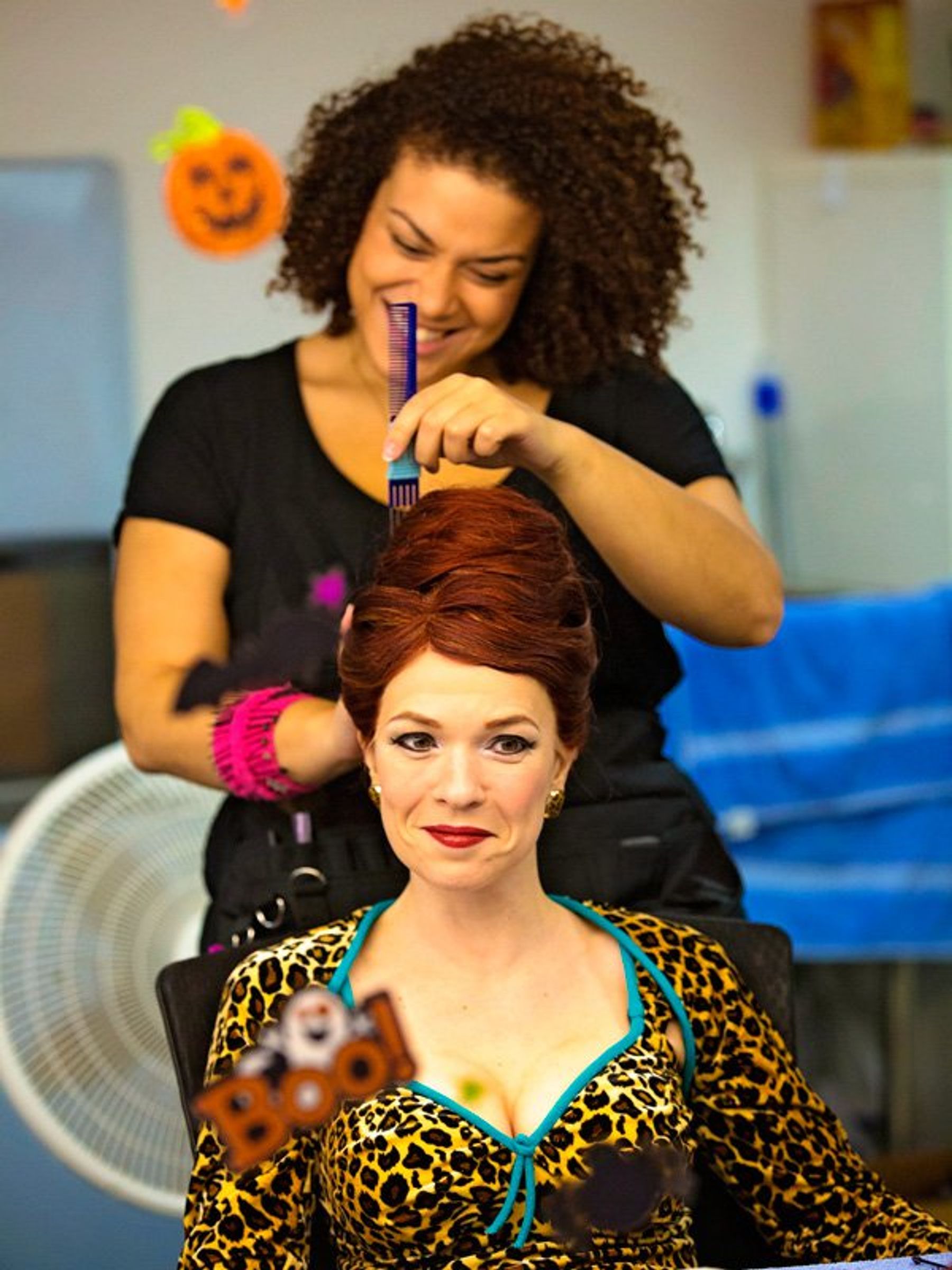Dramatic Difference
New Era for Alley Theatre opens doors to playwrights and unlimited theatrical possibilities
For theater patrons and downtowners alike, the Alley Theatre’s recent $46.5 million building renovation offers much more to audiences than any series of before-and-after photos can convey. Beyond the easy-to-spot design updates in the lobby, grand stairway and reception area, beyond the power-washed exterior, the driving force of the renovation plan was always to enhance the Alley’s – that is, the theater building’s and company’s – capacity to deliver a wider range of performance experiences at the highest caliber.
The building improvements were envisioned to facilitate the production of new plays by contemporary playwrights, and thus foster enduring relationships with up-and-coming playwrights who will consider the Alley their artistic home.
“The emphasis on new work was behind the whole idea of the renovation of the theater,” says Gregory Boyd, artistic director of the Alley Theater since 1989.
In addition to the aesthetic updates, the theater building boasts a dramatically upgraded technical capacity, allowing for nearly unlimited options for set changes, lighting effects and audio elements.
A major focus of the renovation was the Hubbard Stage, the Alley’s main performance space. Upon entering the space, patrons will notice the extended stage, accomplished by reducing the number of seats from 824 to 774. Another stat worth noting: the stage extension allows for 62 percent of the audience to be seated within the first 11 rows from the stage.
“This creates a whole new level of intimacy in the Hubbard for our patrons; one that we feel is unmatched in the City of Houston,” Alley Managing Director Dean R. Gladden said upon the theater’s reopening in September.
The theater’s capacity for set changes is now among the most dynamic in the country, with its all-new fly loft containing 28 full-stage automated line sets. Another remarkable improvement is the now fully trapped stage floor, which allows for endless options for actor and scenery entrances and exits, as well as functioning as an optional orchestra pit.
Additional technical upgrades include the installation of a fiber optic network throughout the theater to support projections and audio content. A new Induction Loop Hearing System allows Telecoil-equipped hearing aids and cochlear implants to function as personalized listening devices that connect directly to the theater’s sound system. Of course, most patrons will notice the interior touches, such as new seats, carpeting, and LED lighting, and will appreciate the buildings new air conditioning/heating system with multi-zoned control to ensure comfort in all areas.
A Haven for Playwrights
In its quest to cultivate lasting relationships with playwrights, the Alley Theatre hired Elizabeth Frankel during the spring of 2015 as its first director of new work.
Frankel joins the Alley Theatre after nine years at New York’s Public Theater, where she was the Literary Manager. She also helped to start the Emerging Writers Group in 2008 and has run the program since its inception, launching the careers of 53 writers in the process.
Having worked in New York for 14 years, Frankel began exploring career options in Houston after making several trips to Houston to visit her husband, who has taught at the University of Houston Law School for past two years. “Each time I visited Houston I thought, ‘I like this city and if I could find the right job I would move here,’” says Frankel. Well aware of the Alley’s status as one of the country’s top-ranked theaters, Frankel reached out to Gregory Boyd last winter.
“That turned out to be very fortuitous timing,” says Frankel. To her delight, Gregory Boyd informed her that the Alley had just begun its search for a director of new work. She flew down for an interview and was hired soon after. Frankel began working for the Alley Theatre several weeks before moving from New York, and then settled into her Houston professional home in July. Frankel happily admits the opportunity worked out very well for her both personally and professionally.
“One of my first projects was to post a job listing for a literary manager,” says Frankel. That candidate turned out to be Skyler Gray, who has developed new work with many theaters including the Williamstown Theatre Festival, South Coast Repertory, and prior to joining the Alley, worked at literary talent agency William Morris Endeavor.
Gray, who was also familiar with the Alley’s reputation, was looking to get back to working for a theater when he found the job posting for literary manager at the Alley. “After seeing the business from both sides, it’s so nice to be back at a theater,” says Gray. “At the agency, I was sending the emails that I’m now receiving and receiving the phone calls that I’m now making, so it’s nice to be back on the other side of the table.”
“It’s really exciting to be able to start a program that’s focused on new work at a theater that is as established and as equipped to do this as the Alley is,” says Frankel. “When I started thinking about other jobs, they were mostly as director of new work at theaters that already had new work programs in place. This is a unique opportunity to start up a program at a well-established theater. That’s exiting to have an established theater that’s in start-up mode. Most of those opportunities are usually at a much smaller theater that is just getting off the ground. Here at the Alley we can go big.”
“And we’re not having to build off of what someone else did before us, we’re not having to fill in the Excel documents that someone else built 10 years ago,” says Gray. “Everything is from the ground up, which is also rare and very exciting.”
Nurturing New Plays
In their first season with the Alley, Frankel and Gray have been focused on the theater’s inaugural festival of new work, called Alley All New. But it’s not just a festival; it’s an artistic approach that will drive the theater going forward. “Alley All New is umbrella term for the theater’s initiative of developing new plays and engaging with working, living playwrights and producing plays for their first time ever,” explains Frankel.
Alley All New, the festival, will be an annual event, featuring several plays presented in workshops and read throughs, but not fully produced. “Our hope is to be able to commission writers and bring them in to workshop their plays at the Alley.”
“This is very exciting not only for the playwrights, the directors, the Alley, but also Houston audiences that will have a chance to be a part of the process,” says Gray. “Audiences may get to see plays go from a reading, to a workshop, to a possible production. They will get to track the life of the plays over the course of a couple of years and see what has been added or altered.”
As Gregory Boyd puts it: “Everybody likes to see how things are put together. Alley All New gives us all a chance to look behind the curtain to see how plays are made.”
Frankel explains that Boyd’s intent is to have the writers feel like they are part of the company in the same way that the actors who live here and are in every show are part of the company.
“Our goal is to bring 15 American writers into the company,” says Boyd. “That was the foundation of why the theater was renovated. We thought about how best to go about producing new plays and, considering that not all plays are created equal, we needed more flexibility to produce different types of plays.”
With the added emphasis on new work, Frankel explains that her approach is not so much about choosing an amazing play, but more about developing relationships with writers. She cites playwrights who have already had multiple plays premiere at the Alley, such as Kenneth Lin, whose plays Intelligence-Slave and Warrior Class debuted at the Alley; and Rejiv Joseph, whose plays The Monster at the Door and Gruesome Playground Injuries were first performed by the Alley Theatre.
“We are looking to have more writers like that who will feel like the Alley can be their creative, artistic home,” says Frankel. “The idea is for the writers to write with the Alley company actors in mind and even the theater space in mind,” says Frankel.
“The Alley has long sought to cultivate its resident company and foster new work, as well as reinvent older work. Now the Alley will be able to make the writers part of the company,” says Boyd. “Writing is an isolating act, with much of the work happening before anyone else gets a glimpse of it. The idea is for the Alley to become the artistic home for writers, not just an artistic halfway house that harbors them on a short-term basis.” [great for pull quote]
Frankel explains that the ability to work with a resident company will appeal to writers and benefit audiences as well. “One thing that’s unique about Alley is the resident acting company – not all theaters have a resident company. The reality for a writer in New York is that writer may write a play with a certain actor in mind, with that actor’s voice in their head,” says Frankel. “And maybe that actor gets to do the first read through, but then by the time the play is actually produced, that actor might be in a TV show or working is some other production, so they’re not available. Here at the Alley, the same actors can do the read through, the workshop and then the full production, so the play, the actors, the whole process gets the benefit of that continuity.”
“Audiences get to watch the plays grow, as well as the playwrights,” says Gray. When Ken Lin’s first play premiered here, he was strictly a playwright, but now he’s also writing for House of Cards, the Neflix series. So audiences can watch the writers’ careers grow while watching their work grow.”
“The festival will be a great first step,” says Frankel. “Audiences will get to see how a play goes from the script on the page to a living, breathing theatrical experience, as well as develop awareness and understanding of the audience’s role in a play.” [great for pull quote]
The Alley’s artistic team hopes to see many industry types come from other cities attend the festival. “In addition to Houston audiences, we hope to host writers, directors and production teams, which should in turn allow each of the plays to have a fruitful life,” says Frankel.
Energized by Support
Boyd expresses his gratitude to Houston audiences and the theater’s supporters. “Houston has been extraordinarily supportive,” says Boyd. “The commitment of the Alley’s board to the renovations has been truly astounding. From the repairs after Tropical Storm Allison in 2003 and plans that were delayed in 2008 with the economic downturn, we had time to really think about what we wanted to do. It was a tremendous collaboration between the board, the resident company artists and the administration.”
Boyd is also grateful for the diversity and depth of Alley Theatre audiences. “Our audiences range from high school students to patrons of more than 35 years,” says Boyd. “They are lively and interesting and seem to have a sense of ownership of each performance.”
Seeing the renovated Alley up and running is invigorating for Boyd, even after his 25 years as artistic director. “A building is a building, and theaters make up an odd branch of architecture. The building is built to last, but what’s inside is evanescent, it’s perpetually changing. And today, all of the building can be performance space. So much feels new – there is a lot of excitement of learning what the Alley can do. We are learning every day, with no ceiling or limit for a quite a while. We are breathing the heady air, and it’s really wonderful.”
Mentioned in this Post
Alley Theatre
615 Texas Avenue


